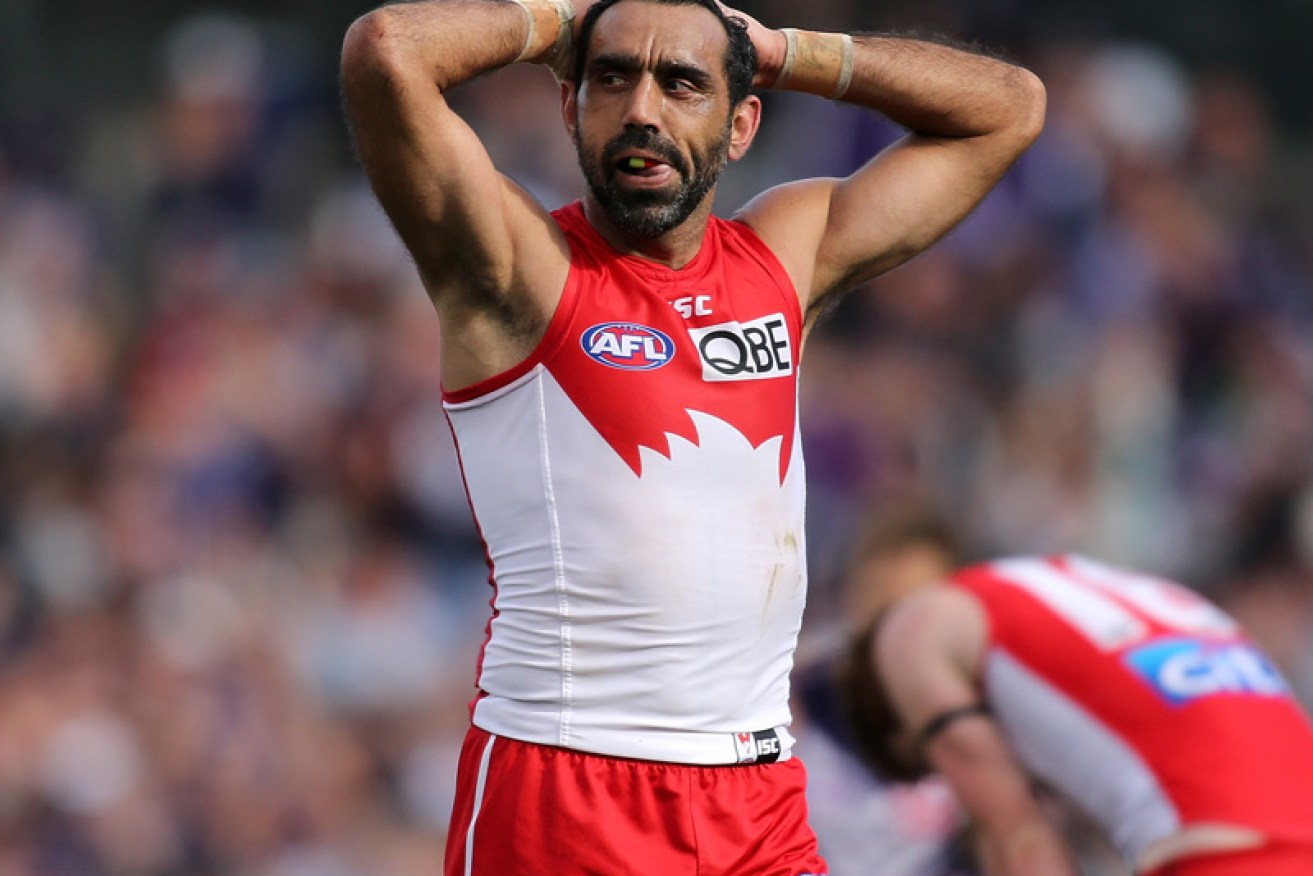AFL’s year of tragedy and triumph marks setbacks and progress


Adam Goodes was hounded from the game. Photo: Getty
The AFL’s drive to be the biggest news in Australian sport throughout means that reviewing an AFL season begins at the end of January and doesn’t end until the clubs send staff home before Christmas.
And while the AFL year was sprinkled with the usual on-field highlights, low-lights, triumphs and near misses, this year – even more than most – it was the off-field drama that defined football’s place in our community.
There’s been a growing backlash from some fans to AFL HQ’s ongoing push to align the league with social progress, if only because it clearly takes some sections of the community time to catch or grow up.
There was no better indication of this than the March controversy over the troll attacks on AFLW player Tayla Harris after the Channel Seven Twitter account posted – and then pulled down – a picture of the Carlton star in action.
Tweet from @taylaharriss
That the initial online attacks saw @7AFL remove the picture along with the post was highly criticised, although the league’s broadcaster re-posted the picture later the same day.
The action shot has since become an iconic image of how far the women of the AFLW have come, and how far there still is to go.
This year also marked a turning point in the way players, and through them, the wider community saw the issue of mental health.
In May, when Western Bulldogs 2016 premiership hero Tom Boyd walked away from his big-dollar contract and football it highlighted the pressure the game demands of young men.
Boyd said physical injury and mental health had taken a toll over five years in top-flight football.
They have now accumulated to a point where I just don’t have the desire to play or the enjoyment of the game I used to have,” Boyd said.
The Bulldogs were widely praised for their handling of the situation, coming so soon after North Melbourne big man Majak Daw was hospitalised after a fall from the Bolte Bridge in the 2018 December off-season.
It prompted a wider debate about mental illness, one that former St Kilda champion turned media commentator Danny Frawley enthusiastically embraced and championed.
Frawley spoke openly about his battle with mental illness, so it was a shock to his legion of fans when in early September he died in a single-car crash near his home town of Ballarat only a day after celebrating his 56th birthday.
His wife Anita Frawley said her husband had battled depression for some time, but had recently “felt invincible” and had stopped taking his prescribed medication.

Danny Frawley is chaired off the ground after his final match for St Kilda in 1995. Photo: AAP
“I want this to be a reminder to all those grappling with mental health conditions … that you should always seek help from professionals when considering making decisions surrounding your mental health, even when you feel as though you have fully recovered,” she said.
Despite the ongoing pressure placed on players and officials through social media and commentary around the game, the AFL was seen to seriously misstep mid-year when some fans complained of over-officious regulation of barracking in the stands.
Pictures soon emerged of Marvel Stadium staff wearing “behavioural awareness officer” vests, with the AFL forced to address the issue and calm a talkback radio tsunami of complaints.

AFL misstep: ‘Behavioural Awareness Officers’ at Marvel Stadium. Photo: Twitter
Those complaints should, however, be taken with a grain of salt when one considered the controversial booing of Indigenous Sydney Swans dual-Brownlow medallist Adam Goodes who felt he was hounded from the game.
A documentary The Final Quarter first shown at the Sydney Film Festival exposed the racism inherent in the booing of Goodes and highlighted that the AFL did little to prevent one of the game’s most decorated players from a sustained and mean-spirited attack.
As September rolled around and Richmond rolled toward its second premiership in three seasons, one of the biggest stories of the year was the selection of Indigenous player Marlion Pickett.

Marlion Pickett evades the Giants defenders in the grand final. Photo: AAP
The 27 year old was a roll of the dice pick for the Tigers in the mid-season rookie draft having done jail time in Western Australia for burglary offences.
After winning the best afield in Richmond’s reserves premiership team he became the first player in 67 years to debut in a VFL/AFL grand final.
That Pickett starred, won a second flag in a week and was cheered all day showed footy’s ability to offer hope, redemption and triumph for all of us, no matter our stripes.








